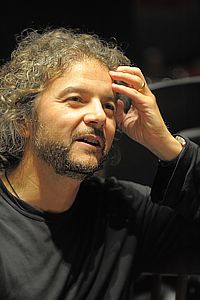

|
Finzi Pasca, who was born in 1964, is from Lugano in Switzerland, is presenting a new reading of Leoncavallo’s I pagliacci for the Teatro di San Carlo. He will be making use of the famous surrealist frescoes of the Cirque du Soleil and miraculous characters from the Cirque Éloize, following on from the recent success of Aida, “naked and a pacifist” that was staged at the Mariinsky Theatre in St Petersburg, where Artistic and General Director Valery Gergiev took a version of distant Egypt that is devoid of any cheap and kitschy contrivances that audiences have become used to through time and tradition. “I adore Leoncavallo,” says Finzi Pasca. “Composed in 1892 and praised by conductor Arturo Toscanini, the opera I pagliacci has no dull moments – it is packed with events and it is fresh and contemporary. The novelty lies in the fact that only I pagliacci will be performed; as a rule, Mascagni’s Cavalleria rusticana, another masterpiece of verismo opera, as part of a joint programme. In almost all of my productions there is a prologue or rain that brings unexpected gifts. Sometimes it helps young shoots grow, sometimes it stunts them. That’s what it will be like wit I pagliacci as well. When you look at the sky it helps you open up your heart.” The choreography for the protagonists in this production will be on par with everything else. “It’s not arbitrariness; when looking at certain original documents again it transpired that that is how it was envisaged, but the publisher did not like the idea and he abandoned it.” And in the eighth scene the famous acrobatic performers will bustle around amidst the protagonists of the opera. “It’s a performance within a performance: in a village in Calabria, Canio the clown and his company are acting out the story of Colombina who is unfaithful to her husband.” There is no border between the imagination and reality. “Canio, deceived by his wife, tells us of the torment of jealousy and of the hopelessness of being obsessed by love.” But before that the director’s magnifying glass splinters and multiplies an image that becomes less defined, less clear, less potent, and turns one Colombina into many Colombinas, one clown into many different variations of one actor, and this actor plays his own self and challenges the acrobat inside himself. “To some extent we are all acrobats, and we know that all the time life is moving to a point where there is no balance. A theatre stage is a risky place. And so, as a stage director, I often return there as an actor, I reconcile myself with my own fragility that a truly great performer can transform into his secret weapon.” Finzi Pasca smiles when presenting such an interpretation of I pagliacci, somewhere between a reverie and buffoonery. “I have always tried to find a language that coincides with the souls of today’s audiences. This story is told in the modern day and using modern language that was born from the old habit of abstractions, hints and images that are close to dreams. Why? Probably because I am a clown: for me the definition of being a clown is of something objectionably fake. In the village, all the people are clowns, they can tell reverie and reality apart. “They are expecting the actors and are surprised to see that Canio does not understand the refined acting and will never be able to enter that magical world that helps us in life.” Canio is stunned and lost. “You can’t have that in the middle. When we tell and present our drama we sublimate them. That’s the only way to understand yourself. But Canio does it the other way round. And that destroys him.” A typical story of love and jealousy in which the main role is that of the cunning trick of a play within a play. “It helps us understand who we are, in an open circle going from the dancers to the singers, from the acrobats to the musicians. Like children: children ask to be told a fairytale at night time so that they can dream and conquer their fears.” Children should play in life in order to understand it. “Canio is incapable of that, he gets confused and is unable to speak, inside him there is noting but borders, he is unable to understand himself and overcome these barriers. He moves across the empty white stage. Around him in a blank world there are figures – figures of real people full of meaning. The style of verismo forces the actors to stumble into the sets which are loaded with stimuli and responses. Today we need precise symbols. As if the development of the soul wished to attain abstraction. “Truly, because abstraction leads it to dialogue with the unconscious from which the power of Leoncavallo’s music emerges along with his short and simple story.” This story has a kind of transparent universality. “Water has some magical quality, this clear liquid substance features in all of my productions, and it will feature in this one too. Seventy percent of the human body is water. It is both inside us and outside us. It continually disappears and always comes back. It is an element of life but water can also knock you down, it’s ideal for depicting the horror that envy leads to. It is pure and clear if you love, while it becomes blood red if happiness deserts you.” He was seen many times during rehearsals in the empty stalls, he would sit alone and think. “In this theatre it’s always as if you are on the tip of a whale’s tongue. You are playing in this huge open mouth. You almost don’t pay it any attention, but you can suddenly catch your breath and feel absolutely tiny.” And suddenly you want to go back and begin another journey. “Love at first sight: Berg’s Wozzeck. Unfortunately, it is impossible to explain why we fall in love. Laura Valente |
